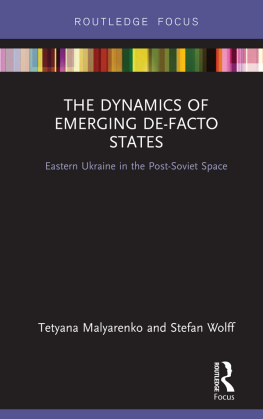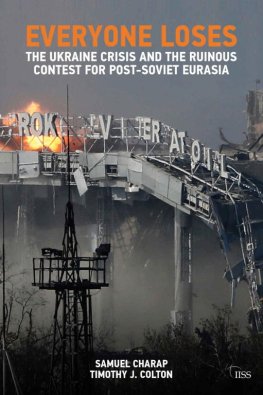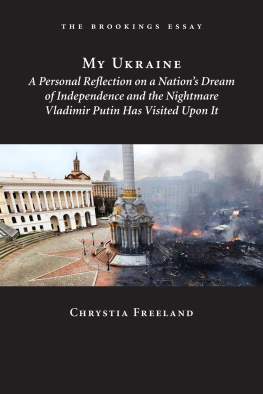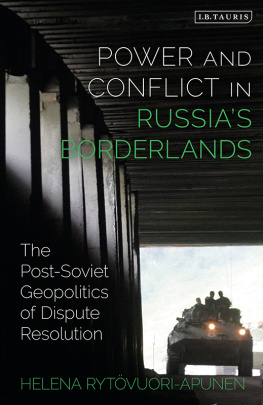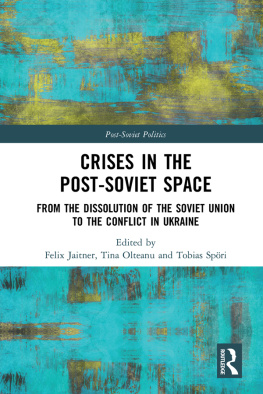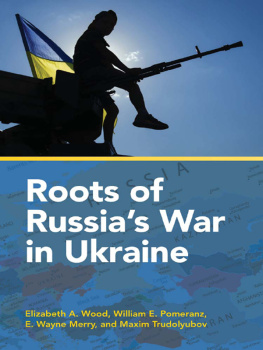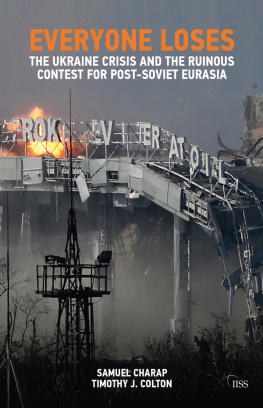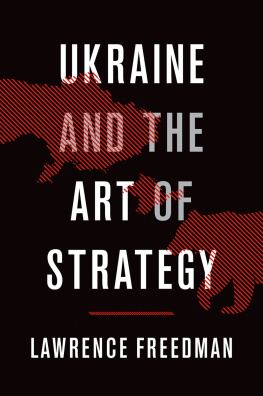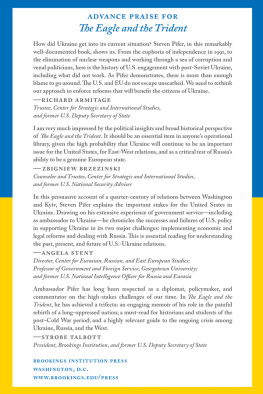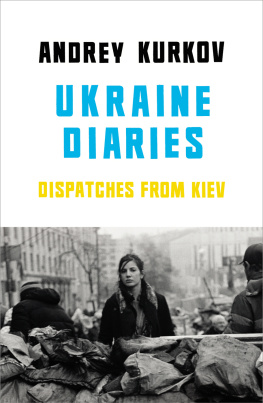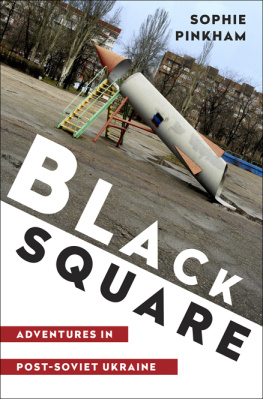The Dynamics of Emerging De-Facto States
What are the causes and consequences of the crisis in Ukraine, and what has been the nature of local, national and external actors involvement in it? These are the questions that the authors examine in this comprehensive analysis of the situation in Ukraine.
The crisis evolved from peaceful protests to full-scale military conflict and to an unstable ceasefire frequently interrupted by, at times, intense clashes between government forces and separatist rebels. Tracing the emergence of two new de-facto state entities in the post-Soviet space the self-declared Donetsk and Luhansk peoples republics from the chaos of the early days after Russias annexation of Crimea in Spring 2014 to the second Minsk Agreement in February 2015, and focusing on the actions of the immediate conflict parties and their external backers, the authors investigate the feasibility and viability of several prominent scenarios for a possible future settlement of the conflict.
As an in-depth case study of the complex dynamics of the conflict at local, national, regional and global levels of analysis, the book complements and advances existing scholarship on civil war and international crisis management, and also provides insights for the policy community and the wider interested public.
Tetyana Malyarenko is Professor of International Security and Jean Monnet Professor of European Security at the National University Odessa Law Academy, Ukraine. She is the founder and director of the Ukrainian Institute for Crisis Management and Conflict Resolution, and has held visiting positions at Johns Hopkins University; the Wilson Centre for International Scholars; the University of California, Berkeley; the University of Granada; the University of Tromso; and the University of Gothenburg. An expert on post-conflict and post-authoritarian transitions, she is the author of numerous books, book chapters and journal articles in Ukrainian, English and Russian. Malyarenko earned her Masters, Candidate of Science, and Doctor of Science degrees from Donetsk State University of Management.
Stefan Wolff is Professor of International Security at the University of Birmingham, UK, and an Associate Fellow at the Royal United Services Institute in London. An expert on international crisis management and post-conflict state-building, he has published over 80 journal articles and book chapters, as well as 17 books, including Ethnic Conflict: A Global Perspective (Oxford University Press, 2007), Conflict Management in Divided Societies: Theories and Practice (Routledge, 2011, with Christalla Yakinthou) and The European Union as a Conflict Manager (Routledge, 2012, with Richard G. Whitman). Bridging the gap between academia and policy making, he frequently advises governments and international organisations and has been involved in various stages of peace negotiations, including in Africa, the Middle East and the post-Soviet space. Wolff graduated from the University of Leipzig, and holds an M.Phil. from the University of Cambridge and a Ph.D. from the London School of Economics and Political Science.
First published 2019
by Routledge
2 Park Square, Milton Park, Abingdon, Oxon OX14 4RN
and by Routledge
52 Vanderbilt Avenue, New York, NY 10017
Routledge is an imprint of the Taylor & Francis Group, an informa business
2019 Tetyana Malyarenko and Stefan Wolff
The right of Tetyana Malyarenko and Stefan Wolff to be identified as authors of this work has been asserted by them in accordance with sections 77 and 78 of the Copyright, Designs and Patents Act 1988.
All rights reserved. No part of this book may be reprinted or reproduced or utilised in any form or by any electronic, mechanical, or other means, now known or hereafter invented, including photocopying and recording, or in any information storage or retrieval system, without permission in writing from the publishers.
Trademark notice: Product or corporate names may be trademarks or registered trademarks, and are used only for identification and explanation without intent to infringe.
British Library Cataloguing-in-Publication Data
A catalogue record for this book is available from the British Library
Library of Congress Cataloging-in-Publication Data
A catalog record for this book has been requested
ISBN: 978-1-138-32884-6 (hbk)
ISBN: 978-0-429-44840-9 (ebk)
Typeset in Times New Roman
by Apex CoVantage, LLC
This book is the result of several years of research and has benefitted from the support of many individuals and organisations.
Thanks are due to the NATO Defence College Rome (Partnership for Peace Programme), the Austrian Marshall Plan Foundation, and the Gerda Henkel Stiftung (Strengthening Democratic Security Governance and the Rule of Law in Donbas: Civil-Military Cooperation and the Management of Current and Future Threats in Conflict-Affected Territories of Ukraine) for their support of Tetyana Malyarenkos work.
Stefan Wolffs research for this paper has been supported by a grant from the UKs Economic and Social Research Council (Research Grant ES/M009211/1: Understanding and Managing Intra-State Territorial Contestation) and through funding from the University of Birminghams ESRC Impact Acceleration Account.
Both authors have jointly received support from the NATO Science for Peace and Security Programme (Enhancing Strategic Analytical Capabilities in NATO Partner Countries) and the EUs Jean Monnet Programme (Project Grant 2016-574646: The EUs Comprehensive Approach to External Conflict and Crisis Management). Some of the initial research was funded by the Centre for East European and International Studies, and we gratefully acknowledge the support of its Director, Professor Gwendolyn Sasse, who also shared with us her own insights into the situation in Ukraine.
We are also indebted to numerous colleagues who have provided invaluable feedback on earlier drafts of individual chapters, including members of NATO Defence College Senior Course 126, as well as Derek Averre, R. William Ayres, Argyro Kartsonaki, Nino Kemoklidze, George Kyris, Harris Mylonas, Kevork Oskanian, Thomas Funch Pedersen, Jasper de Quincey Adams, Olivier Schmitt, Gareth Stansfield, Mark Webber, and Kataryna Wolczuk.
The usual disclaimer remains.
Odesa and Birmingham,
Tetyana Malyarenko
November 2018
Stefan Wolff
1
Introduction
The conflict in Ukraine has evolved since 2013 from initially peaceful protests against then Ukrainian President Viktor Yanukovychs decision to delay the signature of an Association Agreement with the European Union (EU) to full-scale military conflict in 20142015 and to an unstable ceasefire interrupted by, at times, intense clashes between Ukrainian armed forces and separatist rebels in the Donbas region in the east of the country.
The conflict has had profound consequences locally, nationally and beyond Ukraine. Apart from the loss of life and physical destruction, it has caused the internal and external displacement of over two million people. The conflict has also led to the establishment of yet another de-facto entity (or, in fact, two) in the post-Soviet space, and one that dwarfs existing entities in geographical and population size. Due to the intense internationalisation of the conflict, the crisis in Ukraine has also been one of the most important drivers for the deterioration of relations between Russia and the West. As such, it poses one of the most critical contemporary challenges to European and international security.

